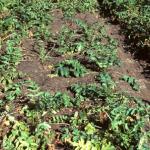Carrot & Parsnip, Rhizoctonia Crown and Root Rot
Rhizoctonia solani
Crown and root rot of parsnip caused by Rhizoctonia solani is occasionally a problem in North America and is primarily a storage disease.
Identification:
This pathogen can cause root rot, damping-off, crown rot, and petiole lesions. Symptoms on the taproot can be mistaken for the cavity spot pathogen (Pythium species).
Life Cycle:
R. solani is a natural inhabitant of the soil and can survive there indefinitely as a saprophyte in plant debris, in infected weed hosts, and as sclerotia (structures that survive unfavorable conditions). Infection of the crowns may occur under favorable conditions of warm temperatures, abundant water, and excess nitrogen levels. Spread from plant to plant occurs when the plant canopy is dense. Lesions on roots continue to develop after harvest and in storage.
Crop Injury:
This disease results in premature senescence and death of the foliage, reducing yield.
Cultural Controls & Prevention:
- The pathogen has a wide host range making crop rotation as a disease management tactic unsuccessful. Problems with this disease are more severe in organic soils and whenever undecomposed crop residue is present.
- Avoid rotations with legumes and alfalfa which increase disease risk.
- Wide spacing, weed control, and clean cultivation help reduce field infection by allowing soil to dry quickly.
- Avoid bruising or wounding during harvest.
- Proper storage management is important. Store parsnips below 50 F and with relative humidity less than 95%. Avoid water condensation on roots by circulating air.
- Fungicides provide little control.
Chemical Controls & Pesticides:
For Current information on disease recommendations ins specific crops including information on chemical control & pesticide management, please visit the New England Vegetable Management Guide website.
Crops that are affected by this disease:
The Center for Agriculture, Food and the Environment and UMass Extension are equal opportunity providers and employers, United States Department of Agriculture cooperating. Contact your local Extension office for information on disability accommodations. Contact the State Center Director’s Office if you have concerns related to discrimination, 413-545-4800 or see ag.umass.edu/civil-rights-information.

